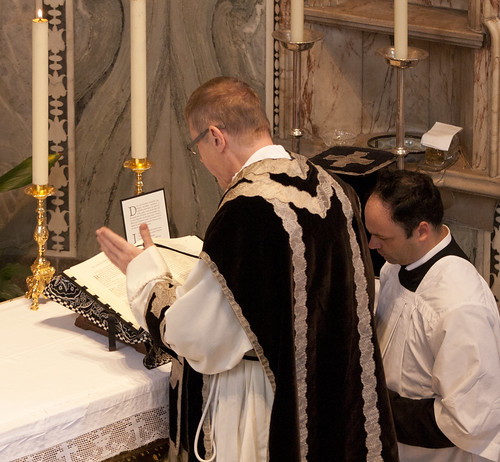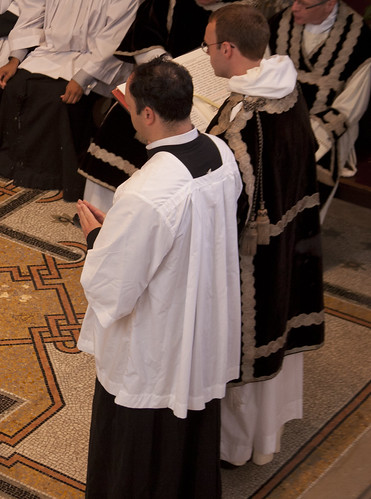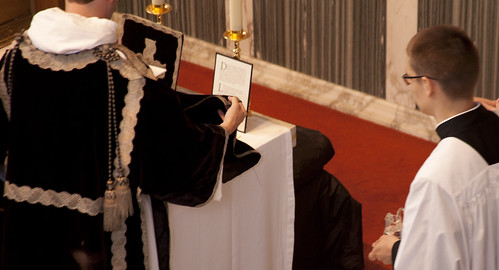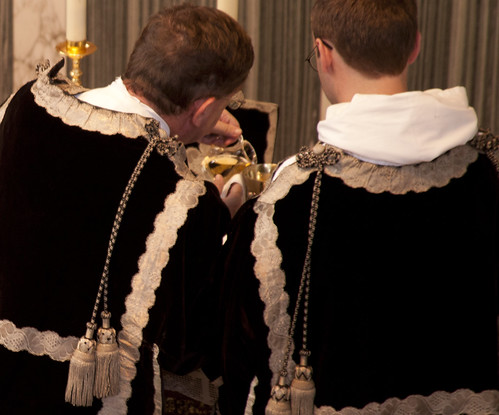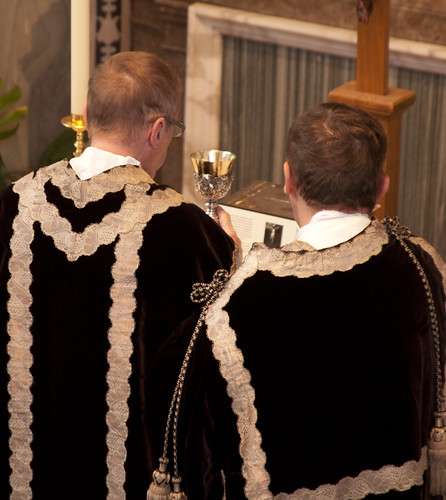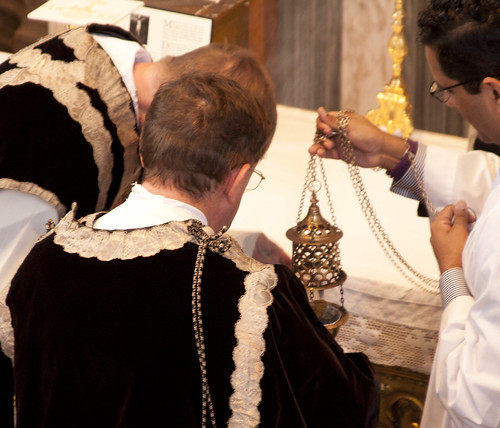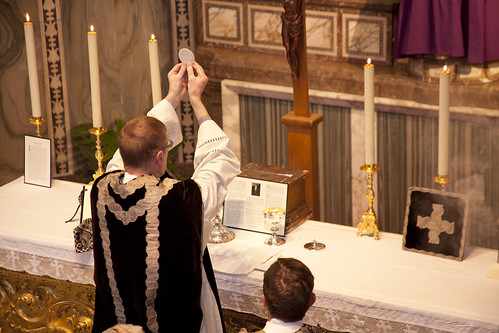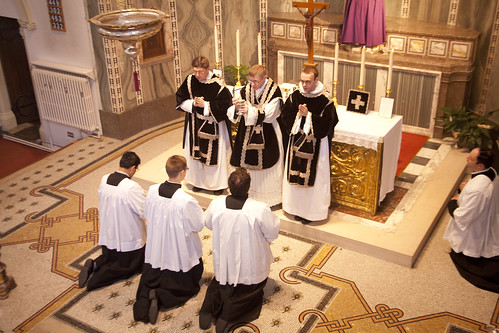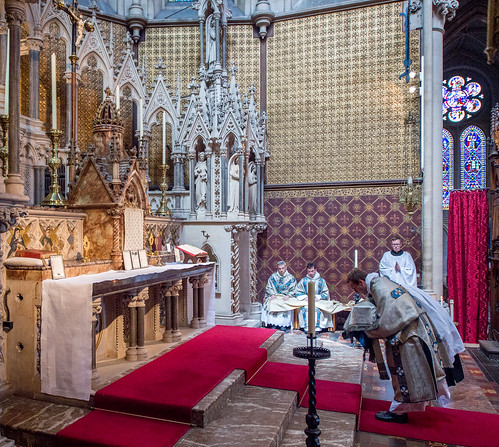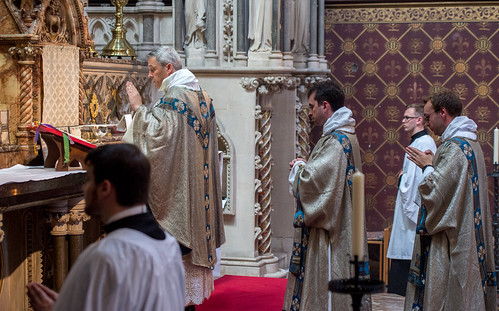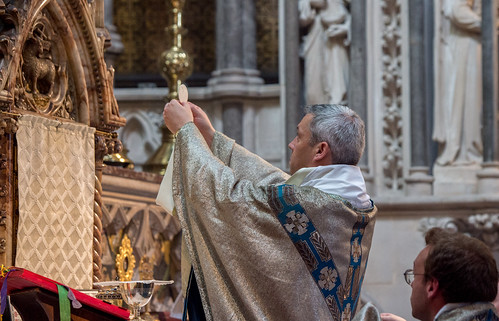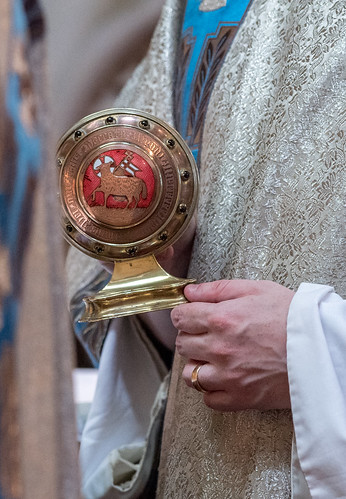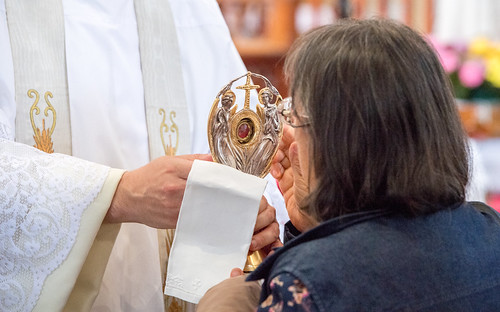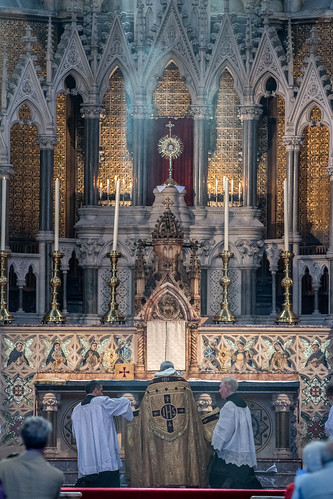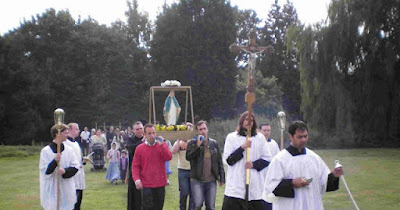Chairman's Blog
More on 'liturgical reconciliation'
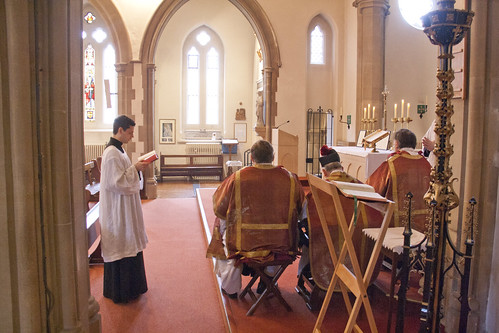 |
| The Prophecies of the Ember Saturday (of Lent, in this case). A feature of the OF lectionary which I haven't even mentioned. |
The debate about the possible development of the 1962 Missal in the direction of the Ordinary Form, raised by Cardinal Sarah, has brought to light some extra points I'd like to highlight.
Fr de Souza, whose Catholic Herald article on an interview given by Cardinal Sarah initiated the discussion, has written a follow-up piece in which he refers to my Catholic Herald blog post, a post on the New Liturgical Movement by Gregory diPippo, and one by Fr John Zuhlsdorf. It is nice to see us presenting a completely united front, which Fr de Souza notes. But he doubles down on his claim that the superiority of the Ordinary Form Lectionary is 'almost unanimous', except, it would seem, among those (like the three of us) who disagree...
It is certainly very widely said that the OF Lectionary is superior, but though I have seen this sentiment expressed countless times, I have not encountered much in the way of reasoned defence of it in light of criticisms. People think it is just obviously better because it is larger, a quite amazingly lazy argument which runs out of steam as soon as anyone points out that 'more is not necessarily better'. Very few supporters of the OF have bothered to read anything about the liturgy written by Traditionally-minded Catholics, but doubts about the new Lectionary have been around for a long time. I recall one of the first things I read on the liturgical reform, Michael Davies Pope Paul's New Mass, in which Davies suggested out that the three lections on a Sunday overloaded the 'Liturgy of the Word' in relation to the 'Liturgy of the Eucharist', and overloaded the listener who could not be expected to take in three different texts, all probably unfamiliar, some rather obscure, and one not thematically related to the other two.
Davies, who was a long-standing prep-school teacher, further pointed to the fact that if you tell children two stories in quick succession, afterwards they can usually only remember the second. That suggests, in fact, a more optimistic assessment than the facts of experience are able to confirm. Just ask the people coming out of a Novus Ordo Mass what the readings were for yourself.
This is hardly the last word on the subject; I mention Michael Davies because he was making these criticisms, which should at least be addressed, back in the 1980s. Few, I fancy, of the OF supporters who glibly say that their lectionary is 'obviously better' have caught up even with these venerable points, let alone the FIUV Position Paper on the subject, or Matthew Hazell's book comparing the two lectionaries, or any of the rest of the stuff which has come out recently.
As Gregory diPippo says:
I also cannot imagine why Fr de Souza writes that “there is wide consensus that the OF lectionary is superior,” when almost every feature of it has been argued against and contested from every point of view. The new lectionary’s creators were thoroughly convinced that they were restoring an ancient custom of the Roman Rite when they introduced the three-reading system for Sundays and solemnities; this is now known to be completely untenable.
On the more general question of co-existence, Fr de Souza appears to concede the point. Fr Z quotes a speech of Pope St John Paul II which I did not know, which is helpful here (26 October 1998) (Fr Z's emphasis):
In order to safeguard the treasure which Jesus has entrusted to her, and resolutely turned towards the future, it is the Church’s duty to reflect constantly on her link with the Tradition that comes to us from the Lord through the Apostles, as it has been built up throughout history. According to the spirit of conversion in the Apostolic Letter Tertio millennio adveniente (nn. 14, 32, 34, 50), I urge all Catholics to perform acts of unity and to renew their loyalty to the Church, so that their legitimate diversity and different sensitivities, which deserve respect, will not divide them but spur them to proclaim the Gospel together; thus, moved by the Spirit who makes all charisms work towards unity, they can all glorify the Lord, and salvation will be proclaimed to all nations.
Gregory diPippo makes the important distinction between the Temporal and Sanctoral Cycles of the two Forms. Talking about the Lectionary and Feastdays in the same breath obscures this very important distinction. Certainly, saints' days have, of course, changed over the centuries, as new ones are added and so forth.
The Temporal cycle, on the other hand, was one of the stablest parts of the Roman Rite throughout its long and varied history. There are few notable differences between the features of it attested in the oldest Roman lectionaries and sacramentaries in the seventh and eighth centuries, and that of the Missal of St Pius V; those which do exist consist almost entirely of the addition of feasts such as Corpus Christi. It hardly needs repeating that the fathers of Vatican II did not in any way ask for or envision the drastic mutilation of the Temporal perpetrated by the post-Conciliar reformers.
Fr de Souza notes another point of Fr Z's: that adherents of the Traditional Mass have been, to put it mildly, been traumatised by their experiences of recent decades, and any talk of 'reconciliation' needs to take this into account. The obvious thing, in fact, is to let some time pass without any further wrenching changes to the Old Mass: however strong the case may be for tinkering with the New Mass.
Support the work of the LMS by becoming an 'Anniversary Supporter'.
A Requiem in London: on silent and hidden liturgy
Yesterday I attended a High Mass of Requiem in London, in the lovely Church of Our Lady of the Assumption, Warwick Street. I was able to take photos from the gallery, which is enormous: not just a choir loft but a large seating area, curving round both side walls of the church so that the wings are close to the sanctuary of the church: a brilliant place from which to see what is happening.
It struck me how much of the Traditional Mass is not, in fact, intended to be seen at all. Even from this advantageous viewpoint, I only saw glipses of the priest's hand gestures (each of which has a distinct meaning), the blessing of the incense, the pouring of wine and water in the chalice, the lavabo, and so on. It was a High Mass, and in certain points the deacon and subdeacon formed a more complete screen than the servers usually would.
But of course it is the same with the texts. At High (or, indeed, Sung) Mass the Prayers of the Foot of the Altar are inaudible to the congregation, because there is singing going on. At any Mass the Offertory and Canon are silent. And there are all sorts of other texts spoken in a 'low voice': some of which are said in a low voice at the Novus Ordo too, such as the Lavabo prayer (much truncated in the Ordinary Form, but still not supposed to be heard by the Faithful).
There is still plenty to see, and to hear: the senses are certainly not starved, and indeed certain things are made very clearly and beautifully visible and audible indeed, creating a very intriguing and satisfying series of contrasts. But it remains a challenge to any conception of the liturgy which places the edification of the people in the first place. Invisble ceremonies and inaudible words are not, in the normal way of things, going to serve to instruct the people.
We have to adopt a different way of thinking about the Mass. It does instruct the Faithful, but that is not its primary goal. It is true that the carefully busy priest at the altar doing we-know-not-what is itself a lesson, but a lesson in what, exactly?
The point of these ceremonies and texts is that they are liturgically appropriate, indeed called for. They are part of a liturgy which expresses in all sorts of ways the things which we want it to express, addressed not to us, but to God. And they are part of a ritual which has an objective value and efficacy. The blessings and, above all, the consecration of the Sacred Species, is something which happens really, objectively, and it is important for us to know that it does so: it is not dependent on the Faithful's response, any more than on the priest's worthiness.
This is, or should be, particularly clear in a Mass for the Dead. The souls of the departed are not in need of edification by human means. They are in need of our prayers and of the offering of the Mass for them. And that is what, in the traditional Mass, they unequivocally receive.
This Mass was celebrated by Fr Mark Elliot Smith, Parish Priest, assisted by Fr Michael Cullinan (deacon) and Br Albert Robertson OP (subdeacon). It was ccompanied by Cantus Magnus under the direction of Matthew Schellhorn. The occasion was the year's anniversary of the burial of Anthea Craigmyle.
Support the work of the LMS by becoming an 'Anniversary Supporter'.
My reply to Cardinal Sarah on 'liturigical reconciliation'
It seems that the most trad-friendly Prelates of the Church actually want the Traditional Mass to disappear. Thus, Cardinal Burke said in 2011:
It seems to me that is what he [Pope Benedict] has in mind is that this mutual enrichment would seem to naturally produce a new form of the Roman rite – the 'reform of the reform,' if we may – all of which I would welcome and look forward to its advent.
Cardinal Sarah has now said the same thing.
It is a priority that, with the help of the Holy Spirit, we can examine through prayer and study, how to return to a common reformed rite always with this goal of a reconciliation inside the Church,
Cardinal Sarah's concrete suggestions point to an intermediate state, in which the two 'Forms' have converged somewhat. I have addressed these suggestions in a post on the Catholic Herald blog here. Notably, the Novus Ordo Lectionary cannot be simply be inserted into the Vetus Ordo Missal, because it reflects a liturgical vision which is completely different from that of the ancient Mass: which is why all the other changes were made at the same time. A compromise between these two two understandings of what the liturgy is for and how it should work will not produce a perfect synthesis, but a muddle.
I've made the argument about the Lectionary at length here, and about the 'Reform of the Reform' falling between two stools here.
Leaving open the question of how Cardinal Burke's thinking may have developed since 2011, why would he or Cardinals Sarah want to get rid of the ancient Mass?
One justification appears to be the idea that the existence of two Forms of the Roman Rite is, regardless of the merits or demerits of the forms themselves, itself a problem. I suppose this idea is related to a certain conservative yen for centralisation and uniformity, but I doubt either Cardinal would want to apply it to the Eastern Rites, even in the West, and I suspect they would not really want to stop the Dominicans, Norbertines, or Carthusians - or the former Anglicans - from celebrating their own rites and usages. So although talk of 'disunity' has a superficial force I don't think this is really driving their thinking here. They don't really want to contradict Vatican II's praise of liturgical diversity. (I have written about liturgical pluralism here.)
I think the more powerful consideration is that they are unhappy with the Ordinary Form. Cardinal Sarah, in particular, has taken up points hammered by Cardinal Ratzinger in The Spirit of the Liturgy, notably about how celebration 'facing the people' was a mistake, and how the reformed Mass should have more silence in it. This is the argument of the 'Reform of the Reform', and it is an argument which has no direct connection with the Extraordinary Form. But Sarah and others seem to think that the existence of the Extraordinary Form creates an extra reason to undertake the Reform of the Reform. 'Look!' he seems to be saying: 'Here are a whole lot of Catholics who refuse to go to the Novus Ordo because it lacks silence, and the priest usually faces the people. Let's make those changes and draw these people back in.'
In other words, his sympathy for some of the arguments about the merits of the Traditional Mass made by its adherents has given Cardinal Sarah the idea of making a purely tactical use of the movement to leverage his position on the future development of the Ordinary Form.
Perhaps things would be different if the EF looked about to take over the whole Church, but if that is going to happen, it would seem it would take at least a century.
I can't say I'm too worried by these proposals. They revive discussions on liturgical matters, which is positive, but opposition by progressive and - let's be honest - middle-of-the-road Novus Ordo priests and faithful to the Reform of the Reform makes the implementation of Cardinal Sarah's programme by fiat from Rome unimaginable, even if he were to become Pope tomorrow.
It should, all the same, stimulate supporters of the Church's ancient liturgical traditions to explain ever more forcefully the point of the ancient Lectionary, and any other threatened features of the Mass they love.
Support the work of the LMS by becoming an 'Anniversary Supporter'.
Photos of the LMS Fatima celebration
The Latin Mass Society organised a Mass and devotional day to mark the centenary of the apparaitions at Fatima, with the World Apostolate of Fatima's statue of Our Lady of Fatima, and their relics of the seers. Photos by John Aron (more here). It took place at St Dominic's, Haverstock Hill, and the Mass was in the Dominican Rite.
Support the work of the LMS by becoming an 'Anniversary Supporter'.
Victoria's Requiem in Warwick Street on Saturday
All welcome.
High Mass of Requiem at 11am
Our Lady of the Assumption, Warwick Street, London, W1B 5LZ
Accompanied by Victoria's Requiem, sung by Cantus Magnus under Matthew Schellhorn
Support the work of the LMS by becoming an 'Anniversary Supporter'.
Fighting for a theocracy? Fr Spadaro speaks
Vatican II called for a practical ecumenism. In Unitatis redintegratio 12, the Council Fathers proclaimed:
In these days when cooperation in social matters is so widespread, all men without exception are called to work together, with much greater reason all those who believe in God, but most of all, all Christians in that they bear the name of Christ. Cooperation among Christians vividly expresses the relationship which in fact already unites them, and it sets in clearer relief the features of Christ the Servant. This cooperation, which has already begun in many countries, should be developed more and more, particularly in regions where a social and technical evolution is taking place be it in a just evaluation of the dignity of the human person, the establishment of the blessings of peace, the application of Gospel principles to social life...
The official channels of ecumenism, such as the 'ARCIC' talks between Catholic and Anglican theologians, have been spectacular failures in practical, just as in theoretical terms, but this passage is not aimed primarily at such efforts, but at ordinary believers at the coalface, as it were, of social and political activism. Such collaborative efforts must, indeed, be seen in the context of the mission of the laity as expressed in another Vatican II document Apostolicam actuositatem, which also talks about cooperation with 'men of good will' (8, 10, 11), and proposes as a proper role of the laity the attempt (19):
to infuse a Christian spirit into the temporal order
When they see this in action, however, not all of the current generation of churchmen are entirely pleased.
Fr Antonio Spadaro, writing with a Presbyterian minister who, in another heart-warming act of ecumenical collaboration, has been appointed editor of the Argentinian edition of L'Ossovotore Romano (Marcelo Figueroa), finds collaboration between Catholics and Evangelical Christians in the United States extremely disturbing. His description of politically active Evangelical Christians as 'Manichaean' and 'Apocalyptic', and as connected with the 'Prosperity Gospel', must, I think, be set aside as a somewhat misguided hyperbole. So must the stuff about them seeing President Trump as a new Constantine, and their wallowing in racism (er, we're talking about American evangelicals?) and Islamophobia. All the same, he is surely serious when he lists the concrete political aims of this coalition: they have
shared objectives ... around such themes as abortion, same-sex marriage, religious education in schools and other matters generally considered moral or tied to values.
This does indeed have some connection with the real world, though the most politically charged issue of the last American election is missing from the list: that of the freedom to manifest one's religious beliefs.
Fr Spadaro thinks that this rather brief list of concrete political aims is part of:
an ecumenism of conflict that unites them in the nostalgic dream of a theocratic type of state.
What, exactly, constitutes a theocracy? I always thought 'theocracy' referred to 'rule by priests', or by some equivalent, specialised religious elite, and I suppose the role of the Shi'ite clergy in the constitution of Iran might be an example, though even Iran obviously isn't a pure theocracy. There are some historical cases of such things, though not terribly many. But Fr Spadaro seems to have something quite different in view: simply a country where the Natural Law is observed on such matters and abortion and same-sex marriage.
I have, however, a strong premonition as to the way in which reunion will not come. It will not come at the edges. 'Liberal' Romans and 'high' Anglicans will not be the ones who meet first. For the odd thing is that the nearer you get to the heart of each communion, the less you notice its difference from the other.
And the evening got darker and colder,
Till (merely from nervousness, not from good will)
They marched along shoulder to shoulder.
Guest post on The Tablet blog: and factionalism

The day that Damian Thompson decries 'factionalism' is the day irony dies. Nevertheless, he has a point: the temperature of internal debate had gone up in recent years to levels not seen since the 1970s, the immediate post-conciliar period of ecclesial introspection and the ferocious persecution of those not thought to be innsufficiently in tune with the 'spirit of Vatican II'.
The reception of Amoris laetitia has similarly stirred up a hornet's nest. I feel in fact that the frayed tempers on social media reflect something really worrying. A lot of Catholic commentators, from across the spectrum of opinon, feel as though they are in a pressure-cooker. Careers and livlihoods are on the line, along with fundamental issues of the Faith.
Here is something I wrote about factionalism back in the innocent days of November 2012. I've reposted the linked piece which had been on The Tablet blog on my philosophy blog, since it is no longer available on The Tablet website.
-------------------------------------------------------
Today The Tablet has published a guest post mine on their own blog: see it here. It is a response to George Weigel's article in last weekend's Tablet, which itself was a response to John Haldane's article calling for married clergy.
See if you can spot the pattern here. In introducing his remarks, Haldane takes a moment to describe the two dominant traditions in the Church, conventionally called the 'conservative' and 'progressive' (or 'liberal') approaches, as, respectively, 'nostalgic and slavish' or 'faithless and craven'. Having thus established his bona fides as a non-partisan, independent thinker, he proposed the most predictable and re-heated item on the liberal menu, the ordination of married men, as the solution to the Church's difficulties.
George Weigel, in introducing his own remarks, condemns progressive Catholics for 'Catholic Lite theology and catechesis,' adding:
Not that the answer lies in the nostalgic Catholic traditionalism also manifest in Britain. Maniples, lace albs and Latin liturgies will not be the engines of a Catholicism worth engaging. Something different, something that cuts more deeply, indeed more radically, is needed; the tired alternatives of the past 40-plus years have clearly run their course.
So, having thus established his bona fides as a non-partisan, independent thinker, Weigel goes on to propose the most predictable and re-heated item on the conservative menu, a call for orthodoxy and evangelical zeal with no practical suggestions to give it any flesh, as the solution to the Church's difficulties.
Both of them decry party spirit in the Church, but both of them use party labels as a lazy and uncharitable way of scoring points against unnamed opponents, and in attempting to create the impression that they are above all that kind of thing, while clearly being no such thing. Politicians call the strategy 'triangulation': you present yourself as moderate by showing how you avoid two extremes, represented by two kinds of opponents. The trouble is, with a bit of practice, everyone from Mao Tse Tung to Ghengis Khan can triangulate, it is just a matter of being clever about how you describe the alternatives. Hey, Bishop Williamson must be a 'centrist', because he avoids the extremes of liberalism and sede vacantism: right?
I don't think this kind of political rhetoric has any place in the Church. We are interested not in whether we are on the left or right of anyone else: we are interested in the truth, the Gospel, the teaching of the Church, Tradition. If Weigal has anything useful to add to the debate, he should stop labeling those he disagrees with playground insults, and tell us what it is.
The point I make in the Tablet blog post is that, although Weigel hasn't noticed, we are moving into an era - thank heavens - when the Traditional Mass is no longer an ideological football. For forty years liberals hated the Traditional Mass because it represented the past, and theology they didn't like. And for exactly the same period of time Neo-Conservatives hated it because they dreaded association with 'disobedience', and kicking the trads was a tried and tested method of triangulation. But now, thanks supremely to the work of Joseph Ratzinger, now reigning as Pope Benedict XVI, people in both camps are beginning to look at the ancient liturgy on its merits.
But remember: Traditionalism is the centre ground in the Catholic debate, because it avoids the extremes of liberal heterodoxy and conservative ultramontanism. People need to wake up the errors of those sad extremes, and come back to the centre. The centre ground is where battles are won: right?
Young Catholic Adults annual RetreatL 20-22 Oct
During the weekend of the 20-22 October 2017, Young Catholic Adults will be running a retreat at Douai Abbey, it will feature Fr. Lawrence Lew O.P., and Canon Poucin ICKSP.
The weekend will be full-board. YCA will be running the weekend with the Schola Gregoriana of Cambridge of Cambridge who will be holding Gregorian Chant workshops.
There will also be a Marian Procession, Rosaries, Sung Masses, Confession and socials. All Masses will be celebrated in the Extraordinary form.
Please note to guarantee your place this year Douai Abbey have requested that everyone books in 3 weeks before the start of the weekend i.e.29th Sept 2017.
Prices start from £18.50 per person per night.
Support the work of the LMS by becoming an 'Anniversary Supporter'.
Institute of Christ the King given another church in Preston, England
Here is the press release.
-------------------------------------------
The historic and landmark (Grade II Listed) Catholic Church of St Thomas of Canterbury & the
English Martyrs on Garstang Road, Preston (known simply as English Martyrs) has been given a
promise of a sustainable future following an announcement made today by the Bishop of
Lancaster, the Rt Rev Michael G Campbell OSA.
Bishop Michael Campbell and Monsignor Gilles Wach, Prior General of the Institute of Christ the
King Sovereign Priest, together with Rector, Canon Adrian Towers, have agreed that, as from the
autumn, the Institute will assume the administration of the church.
This move will enable the church to be open each day to become a vibrant shrine of devotion to
and promotion of the English Martyrs under the care of the Institute who already have the
administration of St Walburge’s Shrine Church, Weston Street, Preston. The new shrine will
specifically provide for the celebration of Holy Mass and the other Sacraments in the extraordinary
form of the Roman Rite.
English Martyrs’ Church is one of two church buildings belonging to St John XXIII Parish, Preston
– the other being St Joseph’s on Skeffington Road. As part of the arrangement with the Institute,
English Martyrs church remains part of St John XXIII Parish and a priest from there will celebrate
an English-language ordinary form Mass in the church, at least for the next 12 months, each
Saturday evening.
Recently, the Mass attendance at English Martyrs has averaged around 70 people and activities
and voluntary parish involvement have become somewhat limited making it difficult for the
parishioners to shoulder their responsibility for the care of the church building.
Bishop Campbell upon making this announcement commented:
“We are very grateful for the Institute of Christ the King Sovereign Priest and the dedication they
have to evangelizing through use of the extraordinary form,” Bishop Campbell continued “The
Institute has shown tremendous energy in conveying a sense of the sacred through their proven
ministry at St Walburge’s and around the world. We are especially encouraged that their care and
ministry in large and historic churches may also be instrumental in preserving English Martyrs
church now and going forward.”
Canon Amaury Montjean for the Institute added:
“We are deeply grateful to Bishop Campbell for his gracious invitation. Our entire Institute family is
very glad for this new apostolate at English Martyrs. Like St Walburge’s, it will be a unique spiritual
home offering Masses with sacred music, daily confessions, days of recollection, classes in
spirituality and doctrine etc”.
Bishop Campbell concluded:
“Finally and importantly, the announcement of this initiative will ensure the future sustainability and
patrimony of English Martyrs’ church; a building so dear to local Catholics and many others in
Preston. Thankfully, this announcement means English Martyrs is saved from the prospect of
closure and is thus secured for the future. The fact that the church will be used each day for prayer
and cared for by the Institute means it will continue to witness to the faith and mission of the
Catholic Church in Preston for many years to come.”
STATEMENT ENDS
Notes to Editors:
The English Martyrs’ Church is located near to Preston city centre and stands on the
corner of the A6 (Garstang Road), between Aqueduct Street and St George's Road.
English Martyrs Church is built on the site of an area that used to be called Gallows Hill. It
received that name after the Battle of Preston of the Jacobite rising of 1715. After the
government overcame the rebel army, it was on Gallows Hill that the rebel prisoners were
executed. On the 5 January 1715, it was recorded that sixteen rebels 'were hanged upon
Gallows Hill, for high treason and conspiracy.'
The Institute of Christ the King Sovereign Priest is based internationally in Florence,
Italy. In many cases, the Institute’s ministry has revitalized and allowed for the restoration
of historic churches. The Institute was established canonically in 1990 by Monsignor Gilles
Wach and Father Phillipe Mora. Inspired by their patron, St Francis de Sales, the Institute
strives to form its people in holiness according to their motto of "teaching the truth with
charity".
In September 2014, the Institute assumed the care of St Walburge’s Church, Preston, at
Bishop Campbell’s invitation – the Bishop designating the Church as a shrine church.
Support the work of the LMS by becoming an 'Anniversary Supporter'.
The problem of catechising children with popular culture
This comment on the American Protestant phenomenon of 'Vacation Bible Schools' is superb, and applicable to attempts to use popular culture in the catechising of children in Catholic contexts too. The post is here.
These programs are written and produced by Christians with good intentions, but the baseline bait n’ switch philosophy is perverse, like trying to get your child to eat vegetables by embedding them in a Twinkie. Sure, the child will hear some good things about God, but the medium of the message—the razzle-dazzle theme, characterless music, throwaway crafts, forced theatrics, the theological minimalism—is what the child internalizes.
The deeper message conveyed is that what is meant to be an eternal truth is derivative, unserious, inauthentic, forgettable, commercial, frivolous, and cheap. Based on the evidence, millennials figured out how to nibble at the bait and leave the hook bare.
To speak generally, the medium of the message becomes its own catechesis, catechizing children in the forms of pop culture. The shallow entertainment value of attention-grabbing imagery and soundtracks keeps the soul bopping around from thought to thought, preventing any sort of serious reflective thinking. Yes, even four-year-olds are capable of reflective thinking!
The author, Peter Burfeind, doesn't do so well with proposing a solution: his idea seems to be simply to offer children a better version of the same thing. I am involved in a Catholic Summer School, admittedly for older children than he seems to have in mind, and our solution is something completely different: an introduction to Catholic culture and the Catholic intellectual tradition, the public prayer of the Church in their traditional forms, and the Sacraments. It's not so very difficult, really.
Support the work of the LMS by becoming an 'Anniversary Supporter'.

